Research supports the use of herbs for nerve damage by combating chronic inflammation and body toxicity.
Herbs have been used for healing since ancient times, and current research shows our ancestors were on to something. There is plenty of evidence to believe that these early remedies possess the power to combat chronic inflammation and neutralize damaging free radicals, two worst enemies of neuropathy.
Chronic inflammation is the result of an overstimulated immune system constantly triggered by foreign invaders such as environmental toxins, allergens, chronic infections and pathogens, and many diseases. When constantly under attack, your immune system is at risk for escalating out of control, attacking whatever happens to be in the near vicinity. Tissues, nerves, the whole deal. It is easily one of the most common underlying root causes of nerve damage in the human body.
Fueling this battle are the toxins you are exposed to throughout the day which your immune system sees as invaders. Your detoxification system is continuously working hard to eliminate these enemies. In fact, it is critical to keeping you alive. Without it, waste products would build up and you would become fatally ill.
But living in the excessively toxic world that we do, with our commonly antioxidant deficient diets, our detoxification systems cannot keep up. The toxic overload damages cells. Especially delicate nerve cells, causing the miscommunication and degradation that characterizes neuropathy.
Along with most diseases, most types of neuropathy will also benefit from a healthier internal environment. Providing your body with the nutrients and antioxidants it needs to do its job well is a good step towards reducing symptoms of nerve damage and nerve regeneration.
These seven herbs not only provide powerful anti-inflammatory and antioxidant compounds, but a whole host of nutrients your nervous system will thank you for.
1. BASIL
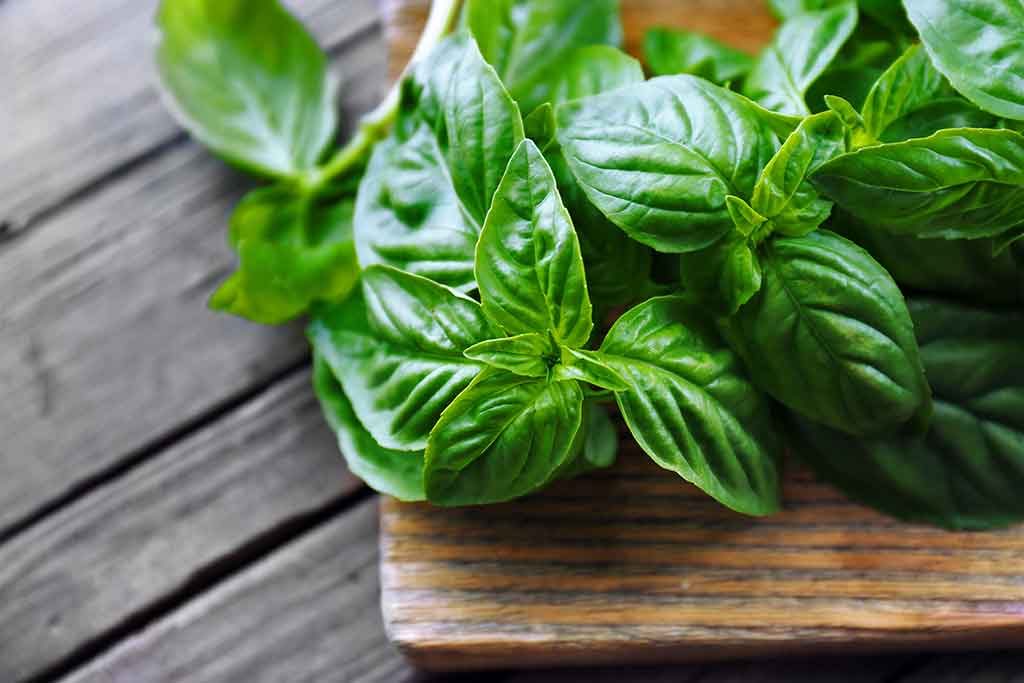
Bypass the aspirin, ibuprofen, and naproxen…load up on basil. Eugenol, an oil found in basil, inhibits the enzymes that produce inflammation. In fact, the same enzymes targeted by nonsteroidal anti-inflammatory pain relievers.
Basil also provides vitamin A, which contains beta-carotene, powerful antioxidants that protect cell linings in many structures of your body from free radical damage, including blood vessels that nourish your nerves.
Potentially the most beneficial aspect of this herb for nerve damage comes from its content of flavonoids, other powerful antioxidants. Further human studies are needed, but a host of preliminary findings suggest that flavonoids block molecules that stimulate inflammation.
Research has shown strongly shown that basil restricts the growth of harmful bacteria, too numerous to list. Bacteria, when left to proliferate, leads to chronic inflammation, which may lead to nerve cell damage, among a host of other diseases, including heart disease and cancer.
Other vitamins and minerals in basil include iron, calcium, manganese, magnesium, vitamin C and potassium.
Add basil to: salads, fruit salad, scrambled eggs, pesto
2. DILL
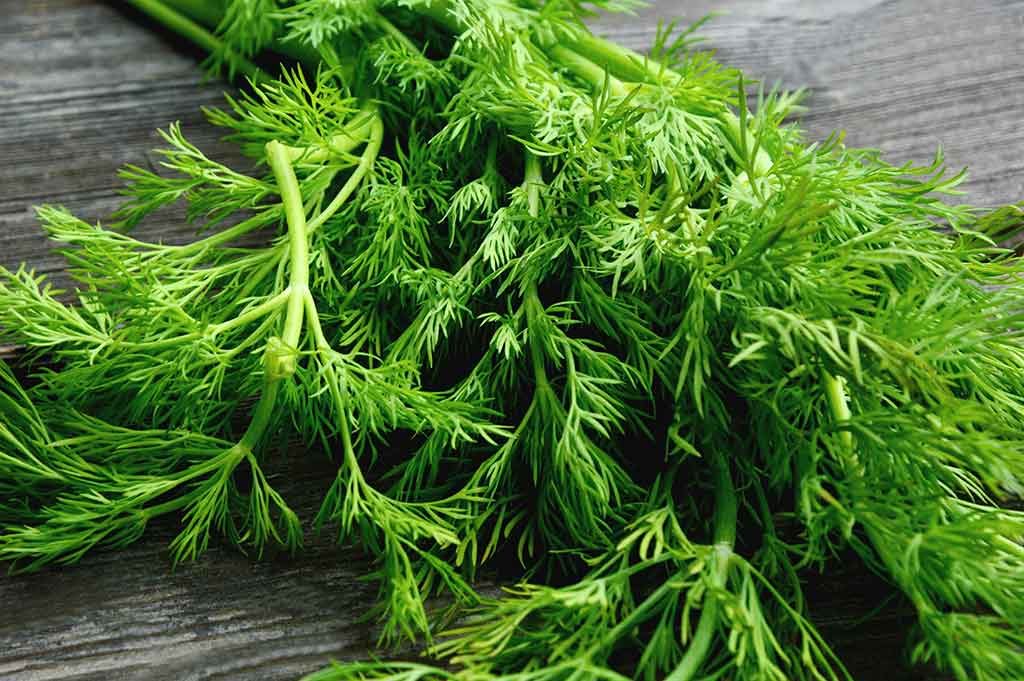
Nutrients important to nerve health, such as calcium, manganese, folate, riboflavin, and vitamins A, C, and B6 are contained within this ancient herb with a long history of use in calming ailments. Just one tablespoon of dill seed contains more calcium than one-third cup of milk. A teaspoon a day provides 40 percent of the recommended daily amount of calcium. Dill seeds are deemed chemoprotective (protecting healthy tissue from the toxic effects of anticancer drugs) and regarded for their ability to neutralize the damaging toxins we encounter daily, such as air pollution and automobile exhaust.
Add dill to: soups, scrambled eggs, potatoes, chicken, egg salad, creamy dips and dressings, rice, seafood
3. OREGANO
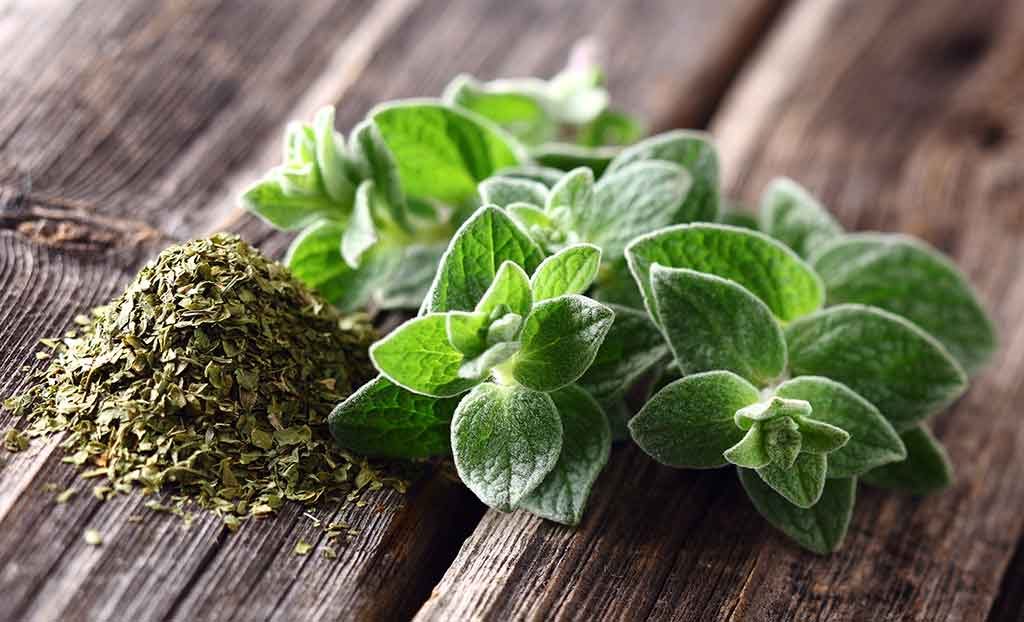
This delicious herb has one of the highest antioxidant ratings, with one teaspoon containing more than 42 times the free radical fighting power of an apple.
Oregano contains rosmarinic acid, a mast cell stabilizer that is anti-inflammatory. It is also heralded for its ability to reduce cytokine release, for a double punch to chronic inflammation. Oregano is rich in antioxidants, which are compounds that help fight damage from harmful free radicals in the body. Rich in folate, this universal herb helps form RNA and DNA building blocks for cellular regeneration. We also know that oregano contains vitamins A, C, E, and K, as well as fiber, folate, iron, magnesium, vitamin B6, calcium, and potassium.
Add oregano to: sauces, meats, soups, salads
4. PARSLEY
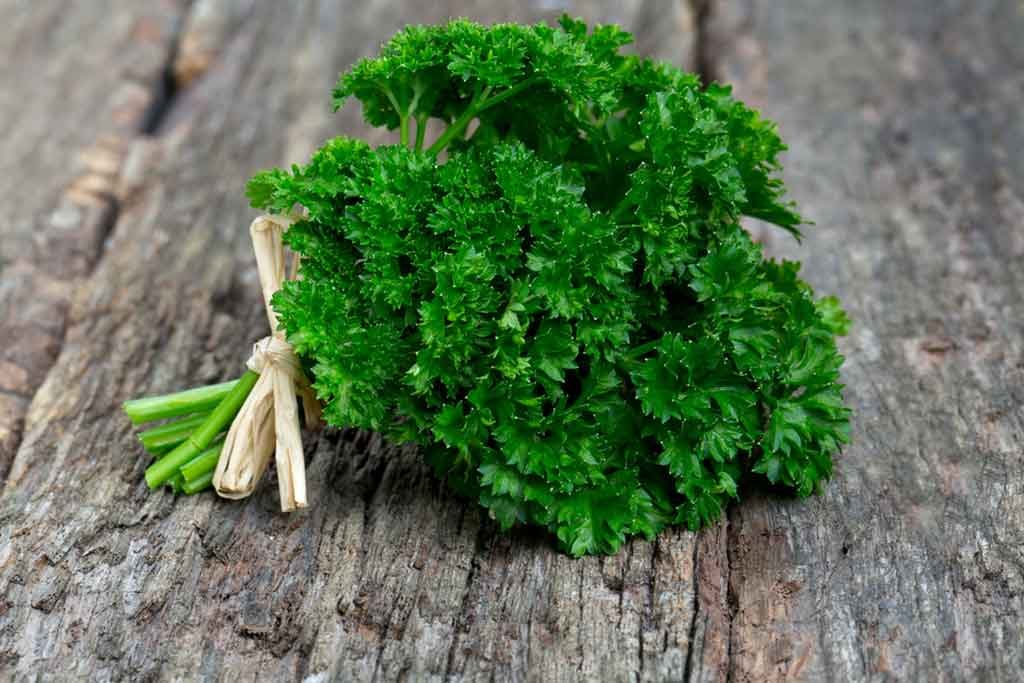
So much more than a garnish, parsley is rich in apigenin, a flavonoid that reduces inflammation by reducing the production of TNF-alpha, IL-8, IL-6, and COX-2. It is commonly thought to aid in detoxification, your blood purification system, and often touted to have the ability to escort mercury out of your body, which can sometimes be found in the environment and dental fillings. Like basil, parsley contains eugenol that inhibits the enzymes that produce the enemy — inflammation.
And check this out, parsley contains more vitamin C than oranges, without all the sugar.
Add parsley to: soups, salads, smoothies, creamy dressings and dips, pesto
5. ROSEMARY
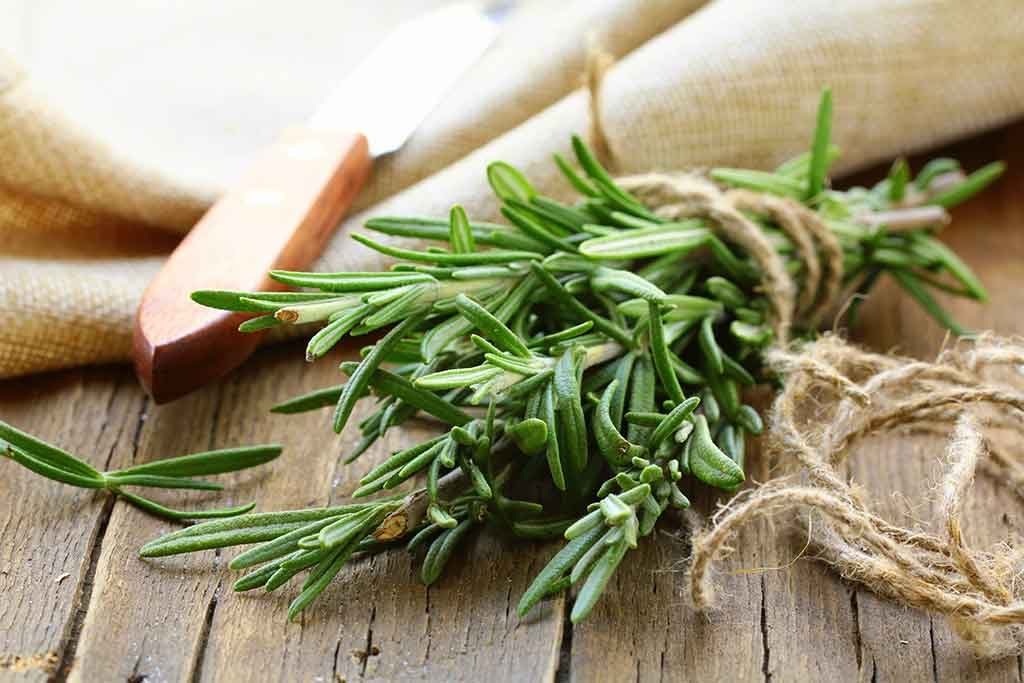
The polyphenols and terpenes in rosemary are great weapons against inflammation because they’re naturally occurring antioxidants. They have the power to neutralize free radicals in the blood, which shuts down the inflammatory response. As a result, veins and arteries are less likely to become narrowed or clogged, and may lessen pain, swelling, and stiffness associated with peripheral neuropathy.
A 2012 study published in Phytomedicine found rosemary to have the ability to halt the proliferation of certain cancer cells, particularly ovarian. Rosemary is also known for its circulation-boosting abilities. It contains flavonoids, important for strengthening blood capillaries. Healthy blood vessels are vital for bringing nutrients to nerves.
An extract of rosemary appears to have an insulin-like effect that can help better regulate how the body processes glucose. It’s certainly not a replacement for medication, but regularly adding rosemary to your meals may help reduce the amount of medication you need, or help prevent your insulin resistance from progressing to the point where you need pharmaceuticals.
Add rosemary to: fish, red meat, poultry, lamb, shellfish, roasted vegetables, sweet potato or carrot fries, tea, butter
6. THYME
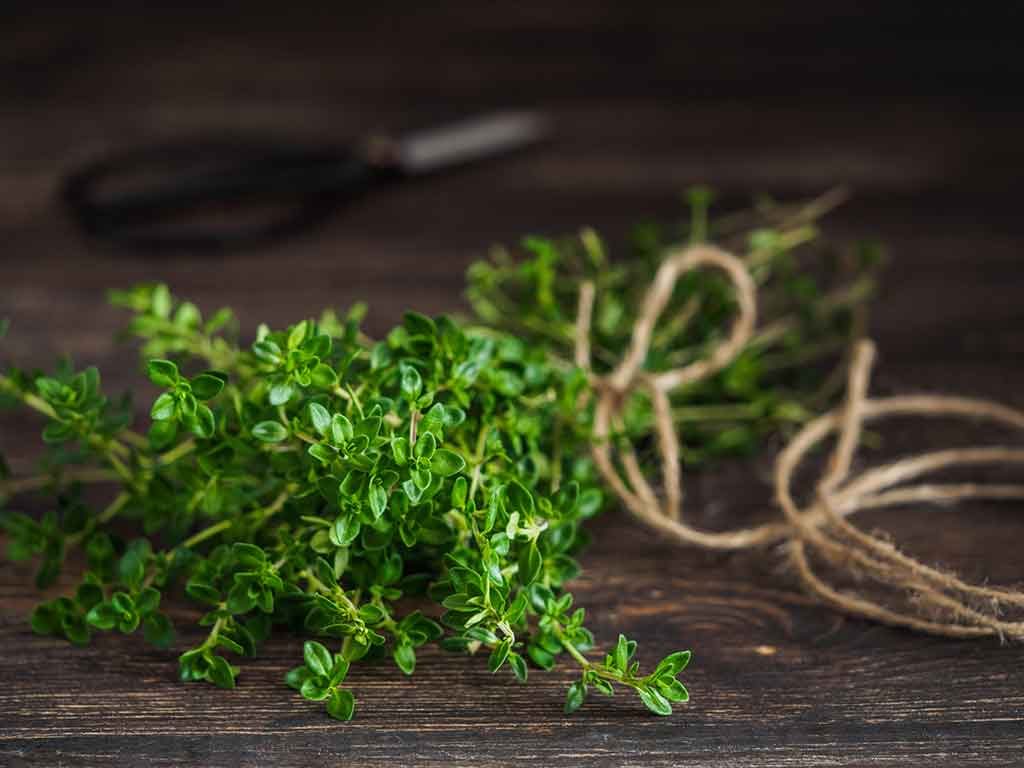
Along with parsley, thyme contains apigenin, a plant flavonoid that reduces cytokine release from mast cells and helps decrease inflammation. Volatile oils in thyme include carvacolo, borneol, geraniol, and thymol, with powerful antiseptic, antibacterial, and antimicrobial properties that have also been shown to be effective against a host of different bacteria and fungi, including Staphylococcus aureus and E. coli. Having plenty of bacteria and fungal defenders on board helps to give your immune system a fighting chance.
Add thyme to: soups, stews, egg dishes, fish, meat, vegetable dishes, beans
Simplify Anti-Inflammatory Meals with Fresh Herbs
Chopping and dicing veggies are sometimes a hindrance in our desire to eat more healthy. When time is tight, take this shortcut. No longer consider these herbs simply as flavor enhancers in your kitchen. Basil, dill, oregano, parsley, rosemary, and thyme are powerful anti-inflammatory and detoxification boosters you can easily add to any meal. Adding fresh herbs to meals can be simplified by keeping an assortment of herb plants in your kitchen. Fresh is best, dried herbs often contain molds that can activate your immune system. Many varieties are a snap to grow indoors by a window, making it easy to snip, chop, and toss on foods for a quick nutritious boost your damaged nerves will be happy about.
Top 4 Reasons Why Olive Oil May Benefit Nerves

Extra-virgin olive oil may hold secrets to not only peripheral nerve health but central nerve…
Fragrant and Satisfying Snack That Helps Fight Both Afternoon Hunger and Inflammation
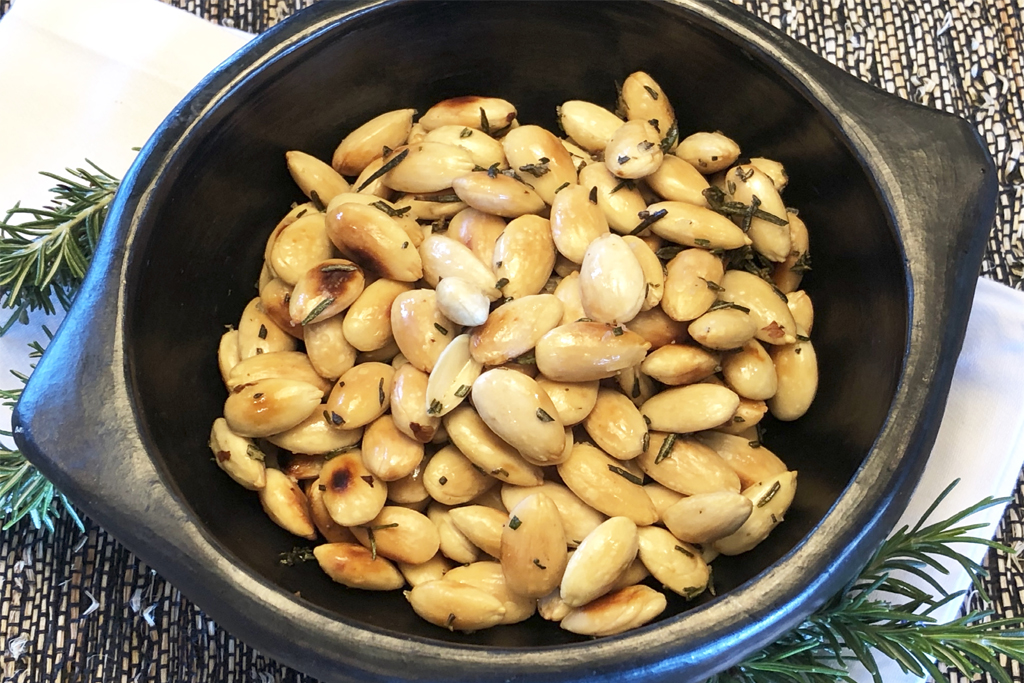
These Rosemary & Olive Oil Almonds are absolutely delicious, perfect for an everyday snack with…
Beware of These Foods That Flare

One of the biggest contributors to the onset of peripheral neuropathy is body toxicity. Your…
3 Best Essential Oils for Soothing Nerve Pain

Peripheral neuropathy comes with a number of different symptoms, each one seemingly more troublesome than…











